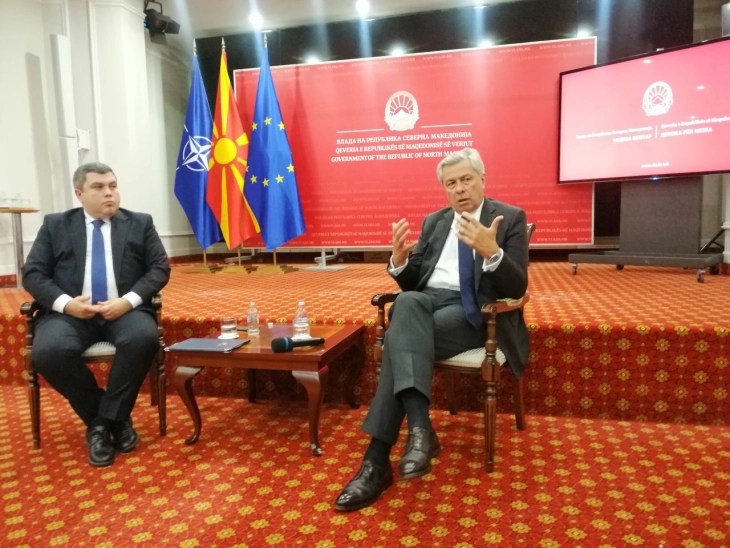Deputy PM, former Croatian chief negotiator discuss bilateral screening, Euro-integration experiences

Skopje, 3 October 2022 (MIA) – The bilateral screening with the EU will begin on November 7. All requirements and tasks identified during the screening will be part of a report for the entire cluster, based on the benchmarks for the opening of the clusters, said Deputy PM for European Affairs Bojan Marichikj and former Croatian chief negotiator with the EU, Vladimir Drobnjak on Monday.
Marichikj and Drobnjak held a press briefing after their meeting that focused on the explanatory screenings regarding the first cluster “Fundamentals” in Brussels and Croatia’s experiences in the Euro-integration process.
The Deputy PM said the explanatory screening was launched on September 15, giving an update on EU regulations since the last explanatory screening rounds in 2018 and 2019. Meanwhile, the screening on the second cluster “Internal Market” will start on October 7, whereas the completion of the explanatory screening a month later will mark the start of the bilateral screening.
“The topics that we heard about over the past couple of weeks – judiciary and fundamental rights, justice, freedom and security, financial control, public procurement and statistics – are part of the first cluster with the intention to cover the aspect of good governance. Besides these chapters, the cluster also incorporated public administration reform, political criteria, functioning of democratic institutions, economic criteria,” said Marichikj.
He noted that during the bilateral screening, North Macedonia would explain, present, assess the degree of implementation of European standards in a certain area, but also undertake a task on the timeframe and the projected percentage for alignment with European standards.
“We are expected to declare in which areas we seek a transitional period after membership and in which areas we seek interim derogation measures, namely environment, where we would need more efforts or more funds,” said Marichikj.
A novelty, added Marichikj, is the accelerated membership, which goes contrary to the transitional periods, i.e. are there areas where we are fully aligned and are already prepared to take part in the European policies, in the format of EU member-states.
“An example of this was the covid-certificate, where North Macedonia was the first non-EU member that joined the system,” said Marichikj.
He said the explanatory screening is taking place alongside Albania, whereas the countries would be separated for the bilateral screening.
Croatia’s former negotiator Drobnjak said it is important to understand the technical side and the terminology of the process for the purpose of proper communication.
“In many elements, this process is identical with the one that Croatia went through but it is also very different in others. The clusters are the novelty that we did not have. Each country is an individual case. It is important to explain to the public that the negotiations are very broad and complex. The entire society takes part and that is why it is important to bring the public closer to the process, so that it understands it better but also to feel it is involved,” said Drobnjak.
He said North Macedonia has an advantage in the EU accession process because it is already a NATO member, along with its 100-percent alignment with the Union’s foreign and security policy.
Asked about a timeframe for the negotiations, he said this is impossible to predict.
“This is mainly due to the new methodology, which is applied for the first time in your case. On one hand, this methodology makes the negotiations more difficult but on the other, it leaves room for further acceleration, something that we did not have. Therefore, it is impossible to answer this question,” underlined Drobnjak.







